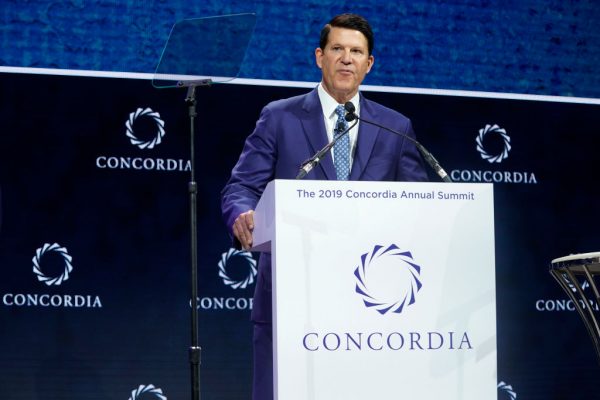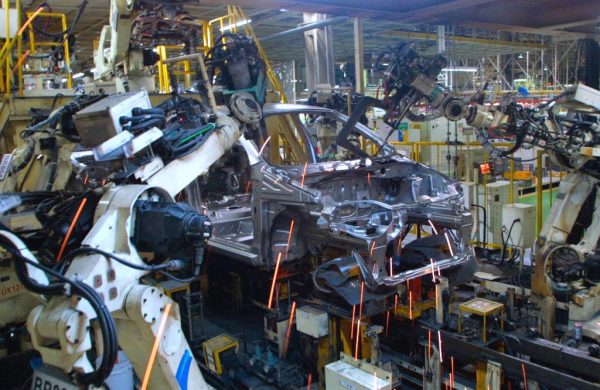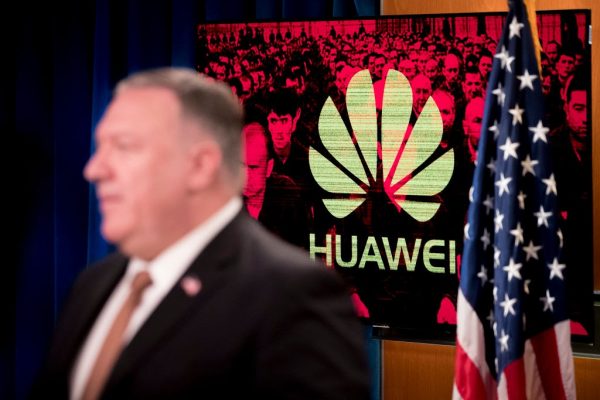A billionaire U.S. tech mogul who first climbed the ivory towers of Detroit and Silicon Valley before landing one of the most elite posts in Washington recently spoke about the historic efforts his team took to curb the rise of one of the Chinese Communist Party’s (CCP) greatest threats, Huawei.
Former Undersecretary of State Keith Krach gave an exclusive interview to award winning journalist Simone Gao, host of Zooming In, during Part 1 of a brand new documentary series titled The American Dream Takes on China Inc.
The documentary focuses on the need for the United States and the free world to waylay Huawei and the CCP’s bid to dominate the world’s 5G technology in an exclusive interview. Krach encapsulated the importance of the efforts in one simple sentence: “Failure is not an option.”

“The laws of the jungle have changed,” said Krach, referring to a modern world more reliant than ever on high-speed wireless computing.
“Speed now is the number one currency in business today and you need that momentum for that digital transformation…And the big, they no longer eat the small. The quick eat the slow,” he said.
Success
You are now signed up for our newsletter
Success
Check your email to complete sign up
The American Dream highlights how a Silicon Valley entrepreneur turned Diplomat dared to prove that “China Inc.,” a term referring to the Communist Party’s state-run capitalist ambitions, is beatable if governments and corporations have the guts to expose its Achilles heel—mistrust.
The American dream
Krach grew up in a small town in Ohio. His father was a German immigrant who owned a machine shop. As a boy, he worked his way up in his father’s factory from sweeping the floors and cleaning toilets to a position as a welder, to being responsible for jobs for the automotive companies, who he called “the big customers.” After a stint of economic downturn, which left only Krach and his father as employees of their company, he went to school to become an engineer with a dream of returning to grow the family business.
Instead, along the way, Krach was recruited by General Motors. The auto giant blessed Krach with a full-ride scholarship at Purdue University and Harvard Business School.
After graduation, he entered the workforce at GM on the executive fast track.
In 1984, Krach became the youngest Vice President in General Motors’ history at the ripe age of 26. He also co-founded GMF Robotics, a joint venture between GM and Fanuc Robotics. GMF Robotics became the largest maker of automobile manufacturing robots on the planet.

In 1987, Krach did the unthinkable. He left GM to serve as an executive in Silicon Valley software startup Qronos. “My friends thought I was crazy leaving mother General Motors back then. And you can imagine what a dream-come-true it was. Something happened while I was running that robotics unit, making all those trips out to Silicon Valley.”
“In my eyes, Silicon valley was the West Point of capitalism and the objective of the game was to reinvent everything; Innovate at scale.”
While the first leg of his journey met with failure after a clash with the CEO of Qronos over corporate values, Krach bounced right back and in 1988, co-founded a mechanical design software company, Rasna Corporation, which he sold for $500 million in 1995 to PTC.
His success didn’t stop there. In 1996, Krach co-founded B2B marketing company Ariba, serving as its CEO. In 1999, Ariba went public at a valuation of $6 billion. By 2000, Ariba had ballooned in value to more than $40 billion.
In 2009, Krach became the Chairman of remote document signing software service leader Docusign. By 2011, he had also become CEO.
He said that one of the biggest things that stuck with him from his journey was the maxim “Failure is the best teacher.”
“And I tasted failure right out of the gate. That scary failure taught me a tremendous lesson about the importance of values like integrity and trust,” he said.
Seeing is believing
Krach described how the first time he visited China was in 1981 for business, but when he travelled to the country again in 2017 to promote DocuSign, he was stunned to witness the changes China had undergone, “It soon became apparent that this time, it [China] was different,” he said.
The big ‘ah-ha’ came when I asked about their relationship with China. They’d say, ‘well, they are an important trading partner, but’… then they would look both ways and lean in and softly say…’but we don’t trust them’.
Former U.S. Undersecretary of State and Silicon Valley Billionaire Keith Krach on the Chinese Communist Party.
He was taken aback by both the “overt propaganda of the Chinese Communist Party” that pervades the country’s now-completely technocratic daily life and “an aggression that forbode a new set of rules were at play.” Krach said he was aghast at the drone swarm technology he witnessed. It was also the first time he had heard about the Party’s debt trap hegemony scheme, the One Belt One Road Initiative.
He realized, “If the CCP and her allies have malign intentions, then the U.S. and her allies, we’re going to be caught flat footed.”
Trump draws an ace
Krach not only left China without forming any joint ventures or partnerships but decided to pay a friend in Washington a visit as concerns over what he witnessed lingered in his mind. The billionaire says had never been involved in politics in his life, but was fortunate to be granted an audience with none other than Vice President Mike Pence.
Krach, formerly Chairman of Perdue University, knew the Vice President when Pence was still the Governor of Indiana.
“I went out to Washington. I just wanted to see if they knew what was going on.”
Krach said after he told Pence what he saw in China, Pence asked him “Have you ever thought about serving your country?”
His was definitive, “My response was that’s a dream I never knew I had.” One thing led to another and Krach was nominated as Secretary of State Mike Pompeo’s right-hand man and confirmed by the U.S. Senate.
In his role as Undersecretary of State, Krach said his mission was “to develop and operationalize a global economic security strategy to drive economic growth, combat economic aggression and maximize national security.”
Krach detailed how trust was the strategy his team used as the key to counter the CCP’s 5G global rollout, “We must have had more than 60 bilateral meetings with my foreign counterparts: economic ministers, foreign ministers, finance ministers.”
“It just seemed like most countries were terrified of China. Nobody even wanted to use the words ‘China’ or ‘Huawei’.”
“The big ‘ah-ha’ came when I asked about their relationship with China. They’d say, ‘well, they are an important trading partner, but’… then they would look both ways and lean in and softly say…’but we don’t trust them’.”
Trust thus became the cornerstone bargaining chip of the U.S. national strategy to counter Huawei and the CCP’s dream to control the future of 5G communications.
Trifectas and trust
Krach’s opening salvo in executing his strategy was labeled the “5G Trifecta” by the press. The three-pronged effort served as a beachhead to a more significant battle against China Inc.’s economic aggression.
The 5G Trifecta was a concrete three-pronged strategy:
- Onshoring Taiwanese industry-leading chip giant Taiwan Semiconductor Manufacturing Corporation (TSMC);
- The “Clean Path” program, which required any network traffic coming in and out of U.S. diplomatic facilities, either at home or abroad, to travel on devices manufactured by companies who are not Huawei; and
- Export control sanctions blocking Huawei’s access to semiconductors and other technologies they needed to produce their technology.
The Clean Path program forced many nations who wanted to use Huawei 5G switches and antennas in a bind. If they did, they would have to install a second set of network equipment made by rivals Nokia or Ericsson to service U.S. diplomats, doubling or tripling infrastructure costs.
Huawei stood on the shoulders of the People’s Liberation Army with billions in state financial backing. It grew with the Communist Party’s blessing by integrating its equipment and services into the more than 800 smart cities across China, while its growth came from underhanded methods like forced technology transfers and intellectual property theft, including theft of router software from Cisco.

Since the 5G Trifecta strategy would force countries and corporations to use competing equipment and end their business dealings with the CCP in the short term, Krach recognized the need of having an established and successful 5G manufacturing industry in America.
His team convinced TSMC to construct a $12 billion 5 nanometer fabrication plant in Phoenix, Arizona. The deal marked the biggest onshoring in the United States’ history and one that brought with it 1,600 high-tech jobs.
TSMC is now rumored to be expanding its Phoenix operations with five more fabrication plants.
Krach said the State Department worked with Congress to “put some serious funding into bringing our semiconductor manufacturing back to the U.S.”
A bipartisan effort with Sen. Kenneth Cornyn (D-OK) and Sen. Mark Warner (D-VA) led to unanimous approval in the House of Representatives and a 96 to 4 Senate victory to approve 30 billion dollars in funding needed for the fight.
Krach believed that these successes would have an additional benefit in the U.S. onshoring of other semiconductor manufacturers.
As Samsung is likely to build a larger facility than TSMC’s, the rest of the international semiconductor chip industry has shown interest in moving facilities to American soil.
American chip producers have rapidly expanded as well. Intel recently committed $20 billion to produce two new facilities in Arizona.
5G, according to Krach, will be the most critical industry to U.S. national security.
With reporting by Simone Jonker














